For almost ten years now, the Kazakhstani programmer Alexandra Elbakyan has been publishing academic research on her online portal Sci-Hub, providing open access to papers that would otherwise be restricted behind paywalls. According to the platform, the number of hosted articles currently exceeds 85 million, making her a frequent target of copyright lawsuits. While she has her fair share of critics, Elbakyan has also been praised by numerous academics for her radical approach to democratising knowledge that is otherwise inaccessible to many.
This interview was conducted by H C-(M), a writer, graphic designer and cultural vector, who focuses on interviews-as-templates to explore topics fuelled by Silicon Valley criticism, guerilla media, surveillance aesthetics and technology + information. Cové-Mbede’s work has been featured on platforms such as the Institute of Network Cultures, The Wrong Biennale, TTT in Art & Science, The Quietus and Metal Magazine.
Since publication of this interview, the interviewer has changed their name to H C-(M).
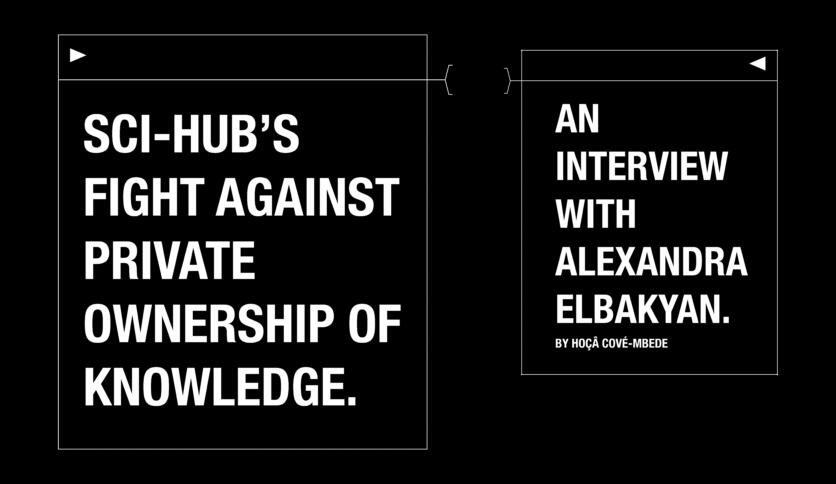
Alone against the paywall
H C-(M): Multiple profiles depict you with specific associations and comparisons with other projects or personas historically and culturally related with online piracy in the USA – from Piratebay, Megaupload and Napster to Wikileaks, Edward Snowden and Chelsea Manning. What are your thoughts on how the media covers Sci-Hub? I’m thinking in particular of an article in Nature from 2016 and a profile published in The Verge in 2018, both of which get cited regularly in relation to Sci-Hub.
Alexandra Elbakyan: In my opinion, Sci-Hub’s media coverage was very little, unfair and biased, I would even say that discussion of Sci-Hub was censored in the media. Sci-Hub is a real revolution in science comparable to CRISPR but media prefer to keep silent about it.
Sci-Hub started in 2011 and from the very beginning was recognized as a revolutionary Open Science project and gained huge popularity among researchers. But only in 2016 did articles about Sci-Hub in the media start to appear. That censorship is perhaps the result of the general perception of Sci-Hub as a Russian project opposed to the US.
I would say that the discussion of Sci-Hub in the journal Nature is very small compared to the real impact of Sci-Hub. In particular, Nature published very detailed descriptions of such open science projects as Unpaywall with pictures. The Unpaywall project is tiny compared to Sci-Hub, but Nature published only very short pieces about Sci-Hub, without pictures. So some readers of Nature journal who do not know much about the topic will have the wrong impression that Unpaywall is much bigger than Sci-Hub, because Nature has described it in detail while discussion of Sci-Hub was little. But in reality, the opposite is true: Unpaywall is tiny compared to Sci-Hub. If Nature was unbiased to Sci-Hub it would have put Sci-Hub on its cover picture in 2016.
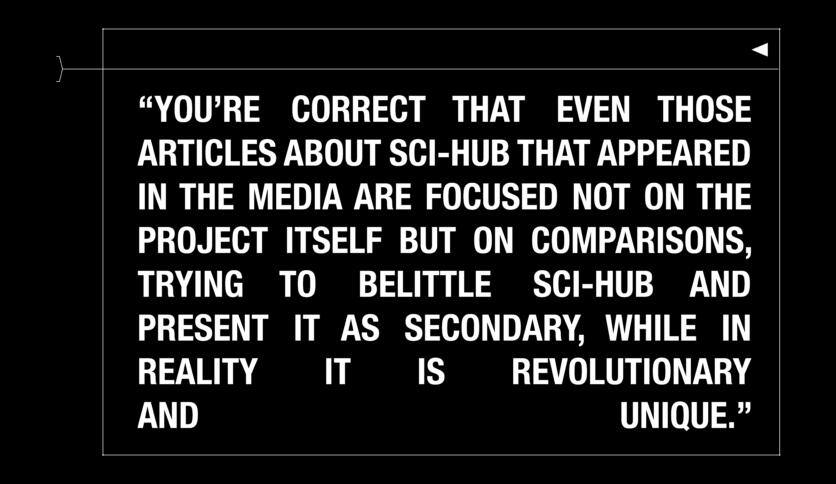
You’re correct that even those articles about Sci-Hub that appeared in the media are focused not on the project itself but on comparisons, trying to belittle Sci-Hub and present it as secondary, while in reality it is revolutionary and unique. In the Verge article, journalists have presented a skewed picture of my conflict with the Russian science fund “Dynasty”, supporting Dynasty. They did not even bother to ask me about the information they collect so I could comment on it!
Wrong information appears not in the media only, but in more reputable sources also, for example, books, such as “Shadow Libraries” published by MIT and in dissertations. I read some of them and there were serious mistakes in my biography and the description of how Sci-Hub works. Again, authors of these works did not even bother contacting me to fact check! While I was always reachable by email.
However in Russian media the current state of affairs is much worse! An extremely unfair picture of me is being promoted; good facts about Sci-Hub are not published. I am being presented as a person who blocked access to academic literature while the reality is opposite. I opened access and not blocked it.
Also, journalists attach to their articles the most horrendous photo of me they can find, instead of asking me to send them a good photo. I guess that some of bad media publications about me and Sci-Hub could be directly paid by Elsevier.
H C-(M): There’s a current pattern of legal tactics that label common words or compounds employed in open knowledge activities as criminal-by-association in regards to free access and text-private-property. Why do you think these legal tactics under the argument of capitalist loss have been used to try to slow down sharing networks and archival repositories?
Alexandra Elbakyan: There is a huge industry around science publishing and copyright law in general, and they have enough money and power to support the status quo.

Copyright and Cursed Books
H C-(M): Do you think the measures against you, like the legal prosecution directed by Elsevier to cease Sci-Hub in 2015, are similar to Middle Age’s curses intended to protect against the theft of books?
Alexandra Elbakyan: In the Middle Ages books were copied by hand and it was a very tedious task and books were precious. So to protect books from stealing, a popular method was to insert a curse in the beginning or the end of the book, so that somebody who steals that book will be cursed and go to Hell or get an illness or something else very bad will happen to them. Because Elsevier and other publishers also insist that their books and articles are being stolen by such websites as Sci-Hub and Library Genesis, I thought that is quite funny and they could also try using curses to protect their articles and books. Perhaps that will be a better method than suing us for copyright?
H C-(M): It is fascinating how the tense relationship between the USA and Russia during the Cold War plays an important precedent in the public eye to generate plots and theories about the origins and intentions of Sci-Hub on copyrighted territories, even though you repeatedly insisted that Sci-Hub is a project you started in 2011. These theories suggest a plethoric range of possibilities, from a fully state funded project by Russian Intelligence, to an ongoing investigation directed by the US Justice Department that targets Sci-Hub as an undercover espionage-project. What is your response to these accusations and what is behind the constant emergence of conspiracy plots toward Sci-Hub?
Alexandra Elbakyan: First of all, these suspicions are understandable: Sci-Hub is an openly communistic project, coming from the former USSR or Russia, with a picture of Lenin pinned on its twitter page. I studied information security at the university, supported Putin politics and Sci-Hub uses supposedly hacked credentials to log in into university systems. All these facts taken together create a classical picture of some Russian intelligence. Also US authorities could suspect that Sci-Hub is an attempt to influence US researchers by the Russian government.
And the second reason for conspiracies is that Sci-Hub is a very cool and advanced project. So many people think: how could an Armenian woman coming from Kazakhstan create this herself? There should be a team of developers behind her face and so on. We still have a lot of prejudices against women, especially young – still many people think that women cannot code or do some serious work in IT – prejudices against race and countries. Just remember the Borat movie about Kazakhstan! After watching this movie, who can believe that something great such as Sci-Hub – and many people consider it great – can come from Kazakhstan? And so on. The funniest thing here is perhaps that because of all that, who will consider me for any great job at all? Hence all I can work on is a project such as Sci-Hub that is illegal in all countries. But even then that work will not be considered mine. It is necessary to note that these prejudices were much stronger a few years ago, when Sci-Hub started, now they are becoming weaker.
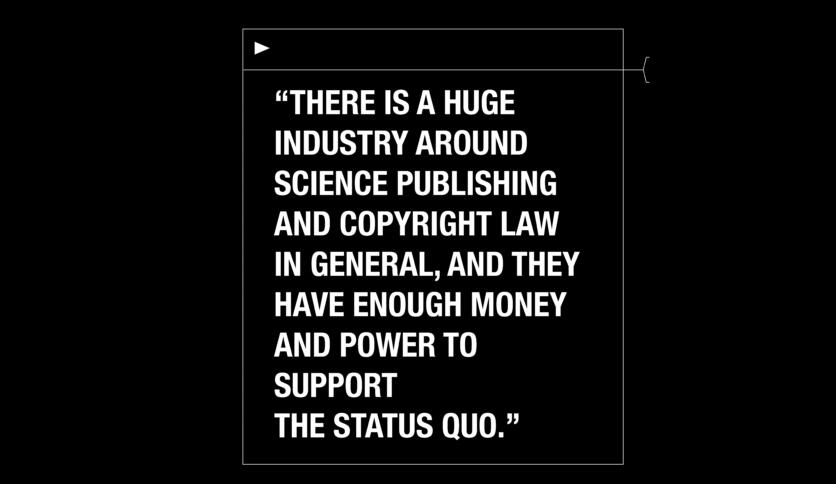
Damaging the Status Quo
H C-(M): In 2016 Marcia Mcnutt (former president of the National Academy of Sciences) wrote a column for Science Magazine, „My love-hate of Sci-Hub“ in which she argues that downloading papers from Sci-Hub could create collateral damage for authors, publishing houses, universities, fellowships, science education, among other areas. The love-hate scenario Mcnutt paints is nonetheless confusing for the debate she wants to open about corporate knowledge inside institutions, since, the whole text leaves serious cracks in her depiction of the publishing system’s function. Accidentally in the same text, she evidences a chain of normalized exploitation towards researchers in her community by not rewarding them in this excerpt: „Journals have real costs, even though they don’t pay authors or reviewers, as they help ensure accuracy, consistency, and clarity in scientific communication.“
If access means power and power is fueled by elevated amounts of money, what are the standards of politically correct access to information aiming for, if not capital accumulation?
Alexandra Elbakyan: I can comment that of course Sci-Hub creates damage: damage to the status quo, because old ways of doing things die and a new reality is born – what is perceived as damage to old ways is just transformation and change.
In her article Marcia McNutt says: „Authors do not benefit from download statistics, for example, which are increasingly being used to assess the impact of their work“. That does not seem as a strong objection to me. After all, the real impact is when some work is cited, not just downloaded? I download many papers to „read later“ for example. You can download and read some paper because it has a catchy title, but it will turn out to be useless for your work.
Sci-Hub collects downloads statistics, although they are not public, but all download statistics have been recorded since 2011 and I have a plan to add the number of views each paper has in the future. So Sci-Hub can be updated to provide such information.
The article goes on: „Libraries cannot properly track usage for the journals they provide and could wind up discontinuing titles that are useful to their institution. As institutions cancel subscriptions, the ability of non-profit scientific societies to provide journals and support their research communities is diminished.“
In my opinion, it is very good when institutions cancel subscriptions, because we need to get rid of that out-dated subscription model that operates by blocking access to knowledge for everyone who has not paid for a subscription. It is not damage but a good thing.
The argument continues that journals that have real costs. My response is that prices currently charged for subscriptions are not used to cover costs but simply to make big profits. An example to illustrate this is that papers published in the 2010s and earlier are paywalled. Why? There is no reason – these papers have been published more than 10 years ago. Haven’t the costs of publishing them been covered already? They could be free, but they are being kept closed access only to extract more profits.

The unifying potential of Sci-Hub
H C-(M): Sci-Hub’s border-less pirate distribution is generating not only scientific capital but also cultural capital, availability of knowledge never experienced before. Language barriers aside, the capacities for scientific development in countries with research shortages may have significant growth in the next ten years thanks to Theft Trade Communication.
In a presentation you made this year about the mythology of science titled The Open Science Idea you made an unexpected statement: modern science grew out of theft. What is the nexus between cognition, communism, and theft inside your studies about the cultural history of science?
Alexandra Elbakyan: Since about 2010 I have astrology as a hobby (yes I know that is considered to be pseudoscience) and in modern astrology, there is planet Mercury that is responsible for all communication and information flow. That is because Mercury is an ancient god of language and speech, trade, travel, and theft. I thought that corresponds very well with Sci-Hub’s mission :-D and the common idea behind all these different activities is the idea of communication. We can find similar gods in other cultures and they are also gods of knowledge, and the god Mercury later developed as god of alchemy, astrology or the earliest forms of science. What we can see here is that science from its inception was connected to communication or to the idea of making something common. Hence private ownership of science by corporations is contradictory to science itself.
H C-(M): Is also worth noticing the high contrast amid the graphic assertions from Elsevier and Sci-Hub and what each one represents and stands for in regard to power and information. I’ve always wondered about Sci-Hub’s logo genesis, because in this case the graphisms go beyond the symbolic.
Alexandra Elbakyan: The history of Sci-Hub logo is less intriguing than it appears to be. When Sci-Hub started in 2011, its first logo was a simple Soviet hammer and sickle, and when the mouse pointer hovered upon it, a text showed up stating: „Communism is … common ownership of the means of production with free access to articles of consumption.“
I took this communism definition from a Wikipedia page and it fitted Sci-Hub very neatly. I was lucky because that definition of communism in Wikipedia was only in 2011 – if you check earlier versions of Wiki article about communism or later versions, they do not contain anything about „free access to articles“.
In 2014 I created a group in a social network to bring together Sci-Hub users (vk.com/sci_hub). First I used the Mendeleev table as a logo, after that it was an alchemical serpent. Later I decided to look up some picture in Google with a key and books to use as a group logo, and found that Raven sitting on books, holding a key. I loved that picture and immediately put it up as a logo on Sci-Hub’s social network group. Later in 2015, I decided to re-design Sci-Hub website and create a modern design, and used the group raven logo as a website logo.

H C-(M): Now that you discovered attractive routes to study information patterns and similarities through history, What do you think about the future of file-sharing consumption under severe .net regulations?
Alexandra Elbakyan: It is quite hard to predict the future, but I hope everything will be OK with Sci-Hub and it will have millions of daily visitors, not just half a million, and be recognized as a legal project.
Many researchers rely on Sci-Hub
H C-(M): We are in the middle of important changes at institutional, corporate and cultural levels in the context of Open Science and information access. In June of 2020 MIT ended negotiations with Elsevier for a new contract, and recently the University of California also renewed negotiations launching open access resolutions with the company. At the same time, many universities are inaugurating new protocols and initiatives to ensure wide and free access for academic resources. Do you consider the recent measures taken by academic organizations to be enough to abolish the paywall-economy?
Alexandra Elbakyan: As we can see paywalls are still there, and Sci-Hub is getting a lot of traffic. It could help if all – or most – science organizations stopped support of the paywall system, not just MIT and the University of California.
H C-(M): In May 2020 you were nominated for the John Maddox Prize by Fergus Kane after almost ten years of navigating heavily corporate waters with Sci-Hub. One curious detail about the award is that it has support from the international scientific journal Nature, Nature’s news team covered Sci-Hub’s legal battle in New York courts unfavorably. What is your approach to this nomination and how significant could it be for Sci-Hub’s potential?
Alexandra Elbakyan: I have seen many times in social networks how people say that I should get a Nobel Prize for Sci-Hub! So I expect a Nobel Prize, not just John Maddox, but of course the prize condition of Sci-Hub is just as unfair as its media condition. Sci-Hub has existed for 9 years so far, praised – and sometimes worshiped – by researchers all around the world: many people say that without Sci-Hub they would barely be able to do science, the project is extremely popular and considered to be revolutionary and… in the nine years of its existence it got no prize! Even tiny discoveries and advances in science collect prize after prize, and Sci-Hub gets no prize year after year – despite its huge popularity and impact!
That John Maddox nomination is a small step towards justice.
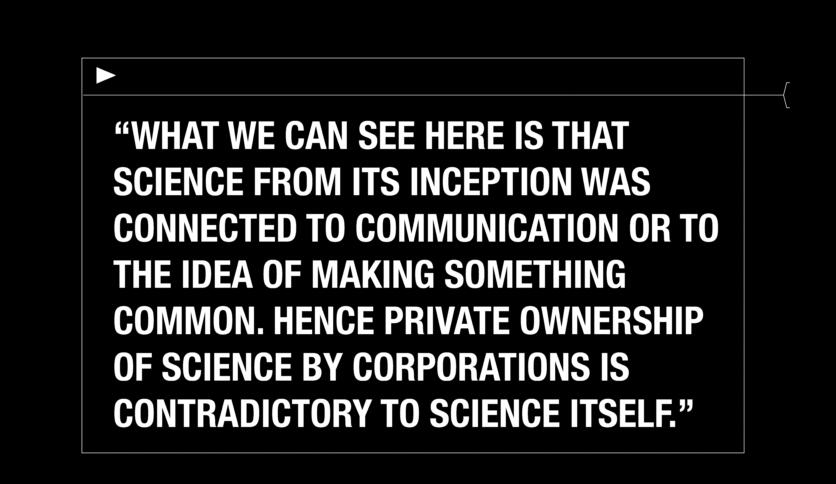
H C-(M): Can you elaborate the statement you made about Elon Musk’s Neuralink similarities with your Global Brain project developed back in 2010?
Alexandra Elbakyan: I’ve written a lot about neural chips in my blog and participated in conferences on that topic. And now Elon Musk is working on exactly the same things I wanted to work on and talked about 10 years ago. But there is not as much work as there is publicity: nothing is done yet, but everyone all over the world know about that Neuralink – so when you talk about brain chips or brain-machine interfaces, people will immediately think that you’re somehow copy-cating Elon Musk, yes? But that topic of brain chips is quite old, attempts to develop and discuss something similar were made back in 2003 and earlier, it all started way before Elon Musk, but the advertisement works in such way that most people think that is Elon Musk’s Neuralink.
A similar thing happened with Aaron Swartz. His name became so strongly associated with that „free science papers“ topic so that when people finally learned about Sci-Hub it was perceived as nothing more but a shadow copy of Aaron Swartz work, while in reality that was not true at all and Sci-Hub started and became popular before Aaron Swartz died and became famous.
Sci-Hub was a unique and extremely revolutionary project, but it became perceived as a shadow copycat just because it was given publicity only after the name of another person has been associated with idea of freeing science by stealing research papers. In the beginning, it really felt as if Sci-Hub was working hard to free itself from that „copycat“ image.
And I wonder whether something similar is being done with Neuralink. Elon Musk is very unappreciative of communism, as we can see from his twitter. So, I wonder if Sci-Hub was somehow the reason behind Elon Musk’s Neuralink.

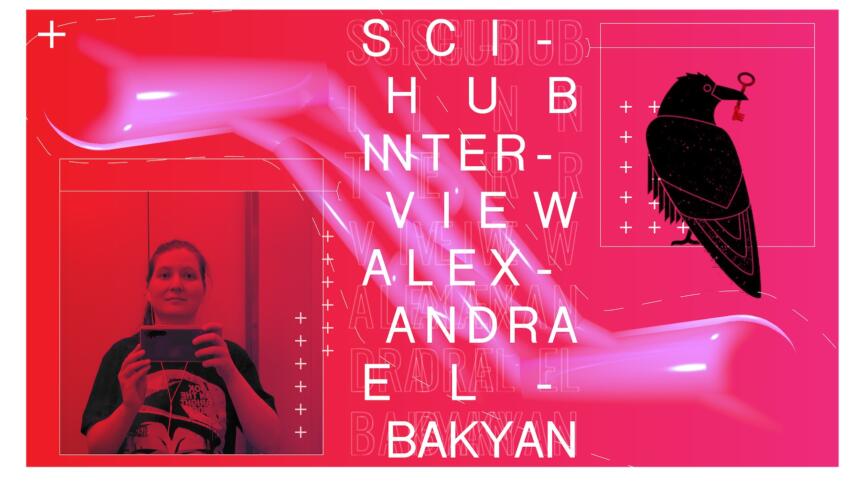



I cannot understand what is democratic about this crazy fight against sharing knowledge, let’s make all libraries illegal then! Authors of peer reviewed journals are being charged for being published! Meanwhile they have almost zero expenses whilst charging over 30 dollars for one article, sometimes even over ten years old!
I study neuroscience and live in London UK, after paying, rent, bills, council tax , TRANSPORT and food how can afford to pay more than twenty pounds for every article I need!?
RIP Aaron Swartz, you did not die in vain because we are moving backwards at exponential levels since 2011 apparently!